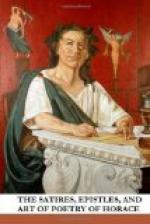To Greece, fair Greece, ambitious but of praise,
The Muse gave ready wit, and rounded phrase.
Our Roman boys, by puzzling days and nights,
Bring down a shilling to a hundred mites.
Come, young Albinus, tell us, if you take
A penny from a sixpence, what ’twill make.
Fivepence. Good boy! you’ll come to wealth
one day.
Now add a penny. Sevenpence, he will say.
O, when this cankering rust, this greed of gain,
Has touched the soul and wrought into its grain,
What hope that poets will produce such lines
As cedar-oil embalms and cypress shrines?
A bard will wish to profit or to please,
Or, as a tertium quid, do both of these.
Whene’er you lecture, be concise: the soul
Takes in short maxims, and retains them whole:
But pour in water when the vessel’s filled,
It simply dribbles over and is spilled.
Keep near to truth in a fictitious piece,
Nor treat belief as matter of caprice.
If on a child you make a vampire sup,
It must not be alive when she’s ripped up.
Dry seniors scout an uninstructive strain;
Young lordlings treat grave verse with tall disdain:
But he who, mixing grave and gay, can teach
And yet give pleasure, gains a vote from each:
His works enrich the vendor, cross the sea,
And hand the author down to late posterity.
Some faults may claim forgiveness: for the lyre
Not always gives the note that we desire;
We ask a flat; a sharp is its reply;
And the best bow will sometimes shoot awry.
But when I meet with beauties thickly sown,
A blot or two I readily condone,
Such as may trickle from a careless pen,
Or pass unwatched: for authors are but men.
What then? the copyist who keeps stumbling still
At the same word had best lay down his quill:
The harp-player, who for ever wounds the ear
With the same discord, makes the audience jeer:
So the poor dolt who’s often in the wrong
I rank with Choerilus, that dunce of song,
Who, should he ever “deviate into sense,”
Moves but fresh laughter at his own expense:
While e’en good Homer may deserve a tap,
If, as he does, he drop his head and nap.
Yet, when a work is long, ’twere somewhat hard
To blame a drowsy moment in a bard.
Some poems, like some paintings, take the eye
Best at a distance, some when looked at nigh.
One loves the shade; one would be seen in light,
And boldly challenges the keenest sight:
One pleases straightway; one, when it has passed
Ten times before the mind, will please at last.
Hope of the Pisos! trained by such a sire,
And wise yourself, small schooling you require;
Yet take this lesson home; some things admit
A moderate point of merit, e’en in wit.
There’s yonder counsellor; he cannot reach
Messala’s stately altitudes of speech,
He cannot plumb Cascellius’ depth of lore,
Yet he’s employed, and makes a decent score:




